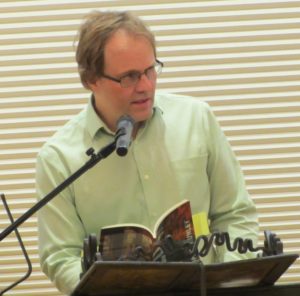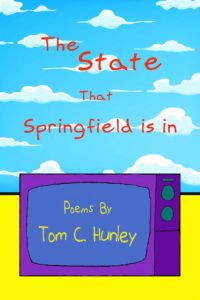The State That Springfield Is In, Split Lip Press, 2016.
Synopsis: Forty dramatic monologues in the voices of characters from The Simpsons.
What do you think makes your book (or any book) a “project book”?
The project was to write about my own issues through the filter of personae drawn from The Simpsons. Just as my Maggie Simpson sees herself in the old, craven face of Mr. Burns, I see a part of myself in each of these characters. When I write about the Van Houtens’ divorce and its effects on young Milhouse, I’m writing about my own scarred, departed youth. When I have Homer wax uxorious about Marge before confessing, in his next breath, to being tempted by the Lurleens and Mindys of the world, you can bet that I have in mind my own marriage to the lovely Ralaina. Like Troy McClure, I yearn to be remembered and fear that I won’t.
Why this subject (or constraint)?
Writing in personae enables a writer to explore different sides of his/her self. It’s a paradox that putting on a mask can enable you to be more freely yourself. I have a son with autism, and until I hit on the idea of writing in the voice of Police Chief Clancy Wiggum, worrying about his square peg son Ralphie, I wasn’t sure how to write about our relationship. Like Moe Szyslak, I have different, conflicting sides to my personality, and I don’t always know how to reconcile them. Like Frank Grimes and Apu Nahaseepemapetilon, I have frequently felt like an outsider trying desperately to fit in. Professor Frink’s loneliness is my own loneliness, as is Comic Book Guy’s. When Lisa Simpson discusses foreign policy and Kent Brockman and Mayor Quimby’s campaign staff weigh in on local politics, they address my own concerns. Edna Krabappel voices my thoughts and feelings about teaching. Reverend Timothy Lovejoy and Ned Flanders articulate my struggles with faith and doubt better than I ever could without wearing their masks, just as Disco Stu and “Bleeding Gums” Murphy help me explain what music means to me. This book of poems is the most autobiographical thing I’ve ever written.
Are you comfortable with the term “project book”?
Yes. I like writing this way. I’ve recently completed another project book called Here Lies. It’s a book of self-epitaphs. Basically, I die a different way in each poem. Having a project is a great way to fight off writer’s block. In the past I was always jealous of novelists, because they could come up with one good idea and it would be enough to fuel three years’ worth of writing, whereas I faced a blank page every day, needed to come up with a new idea every day.
How important was it for you that each poem could “stand on its own” or that the poems should rely on other poems in the book, or on the premise of the project itself, to succeed? What challenges did this present for you when writing single poems or structuring the book overall?
I wanted to place the poems in literary journals, and at readings I can’t read the whole book to people, so I did want the poems to stand on their own. At the same time, I wanted the whole to be more than the sum of its parts, and I think it is.
At any point did you feel you were including (or were tempted to include) weaker poems in service of the project’s overall needs? This is a risk, and a common critique, of many project books. How did you deal with this?
I cut quite a few poems from this manuscript and even more from Here Lies, the project book that I’m currently sending out. It’s good to have some friends whom you trust to be honest early readers. Listening to them will save you some embarrassment. More often than not, my friends who told me to cut certain poems were just echoing my own gut instincts. If you’re not sure whether to include a poem, cut it, reread the manuscript, and see if you miss it. Some of the poems that I cut were very hard to cut, because I had worked hard on them and was attached to them. But now, I barely remember them.
Did you fully immerse yourself in writing this project book, or did you allow yourself to work on other things?
While writing these poems, I was writing another poetry collection entitled Plunk (Wane State College Press, 2015) and co-editing an essay collection called Creative Writing Pedagogy for the Twenty-First Century (Southern Illinois University Press, 2015).
As an editor, how do you see the prevalence of project books and other poetic constraints affecting your submission pile and how you select work for publication?
When I’m at a book fair, trying to sell collections published by Steel Toe Books, it’s a lot easier to make a pitch for a project book than for a more traditional collection. If I’m talking to a reader who isn’t familiar with the poets that Steel Toe publishes, I’d rather say “this is a collection of sonnets about the death of the poet’s father” or “these poems are about female comic book superheroes and feminist icons from mythology” than “this is a hodge-podge of the best poems that this poet wrote during a five-year period.”
What advice can you offer other writers, particularly emerging writers or poetry students who may be using the project book as a guiding principle for their own work?
I don’t know if this is advice as much as it’s a cautionary note. Be prepared for the possibility that writing a project book may exhaust your interest in your subject. For months after I completed The State That Springfield Is In, I couldn’t watch The Simpsons because I had come to associate the show with work and I could feel myself physically tense up when it came on my TV.



